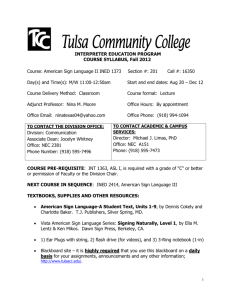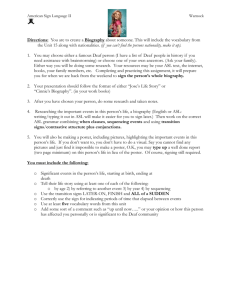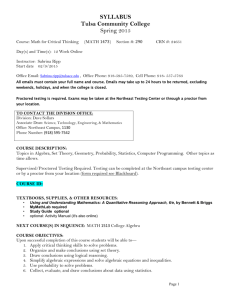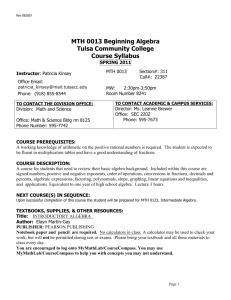INTERPRETER PREPARATION PROGRAM COURSE SYLLABUS
advertisement
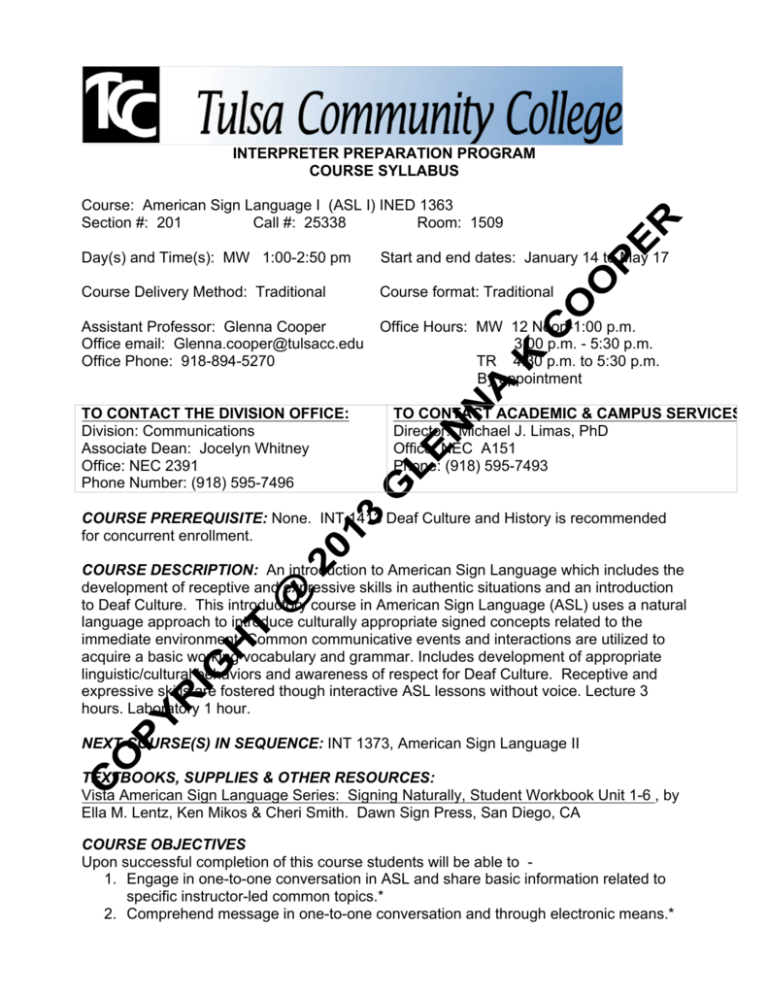
INTERPRETER PREPARATION PROGRAM
COURSE SYLLABUS
Course: American Sign Language I (ASL I) INED 1363
Section #: 201
Call #: 25338
Room: 1509
Day(s) and Time(s): MW 1:00-2:50 pm
Start and end dates: January 14 to May 17
Course Delivery Method: Traditional
Course format: Traditional
Assistant Professor: Glenna Cooper
Office email: Glenna.cooper@tulsacc.edu
Office Phone: 918-894-5270
Office Hours: MW 12 Noon-1:00 p.m.
3:00 p.m. - 5:30 p.m.
TR 4:30 p.m. to 5:30 p.m.
By appointment
TO CONTACT THE DIVISION OFFICE:
Division: Communications
Associate Dean: Jocelyn Whitney
Office: NEC 2391
Phone Number: (918) 595-7496
TO CONTACT ACADEMIC & CAMPUS SERVICES:
Director: Michael J. Limas, PhD
Office: NEC A151
Phone: (918) 595-7493
COURSE PREREQUISITE: None. INT 1413 Deaf Culture and History is recommended
for concurrent enrollment.
COURSE DESCRIPTION: An introduction to American Sign Language which includes the
development of receptive and expressive skills in authentic situations and an introduction
to Deaf Culture. This introductory course in American Sign Language (ASL) uses a natural
language approach to introduce culturally appropriate signed concepts related to the
immediate environment. Common communicative events and interactions are utilized to
acquire a basic working vocabulary and grammar. Includes development of appropriate
linguistic/cultural behaviors and awareness of respect for Deaf Culture. Receptive and
expressive skills are fostered though interactive ASL lessons without voice. Lecture 3
hours. Laboratory 1 hour.
NEXT COURSE(S) IN SEQUENCE: INT 1373, American Sign Language II
TEXTBOOKS, SUPPLIES & OTHER RESOURCES:
Vista American Sign Language Series: Signing Naturally, Student Workbook Unit 1-6 , by
Ella M. Lentz, Ken Mikos & Cheri Smith. Dawn Sign Press, San Diego, CA
COURSE OBJECTIVES
Upon successful completion of this course students will be able to 1. Engage in one-to-one conversation in ASL and share basic information related to
specific instructor-led common topics.*
2. Comprehend message in one-to-one conversation and through electronic means.*
3. Express oneself in ASL one-to-one and through electronic means.*
4. Identify the beliefs, values and attitudes within Deaf culture
5. Engage in one-to-one conversation comparing and contrasting ASL with English or
another language.*
6. Engage in one-to-one conversation comparing Deaf culture with one’s own culture
and other cultures.*
7. Acquire and expand visual memory skills.
*Title: Learning Outcomes for American Sign Language Skills Levels 1-4, Authors: Kim
Brown Kurz, Ph.D. and Marty M. Taylor, Ph.D. Publisher: National Technical institute for
the Deaf, June 2008.
APPROACH:
The curriculum parallels what we know about language development and second language
learning. We focus on introducing language in context and reinforcing what is learned by
engaging you into various interactive activities. A conversational curriculum requires you to
be an active learner. You need to come prepared to sign with me and other classmates.
Our classes are conducted in American Sign Language (ASL) from the very first day. You
are immersed in the language for four hours a week to maximize your language learning.
The teacher will use gestures, signs, drawings and act out situations to get the point
across and your job is to keep trying. This may sound daunting at first, but trust me, it
works!
ASL ZONE: (SIGNING ONLY)
We insist on maintaining a signing environment at all times in the classroom for two
reasons:
• It is considered rude and disrespectful to talk in front of a Deaf person and not make
the information passing between you and the other person accessible. Since a
good number of your teachers will be Deaf and your goal is to get to know Deaf
people in the community. It is imperative that you develop the habit of signing when
Deaf people are present.
• This is an immersion class, which means only the target language is used. Using
only ASL helps you to develop both your comprehension skills quickly and
effectively.
• Talking disrupts this process and delays your language development
• If a fellow student asks you for help, feel free to help by using signs you have
learned or by writing back and forth. In this way, I can see what is being said and
can join in to help, if needed be.
TEACHING METHODS
• Neither the instructor nor the student will be permitted to use voice, except at
Instructor’s designated times. The sign/voice ratio in class will be 95% sign, 5%
voice.
• Students may write questions or comments on the blackboard or on paper for the
document reader.
2
•
•
Vocabulary will be taught through meaningful use of conversation, interaction
techniques, pictures, dialogues, games, etc.
Students will use the video camera for both expressive and receptive development
of ASL in the Facet Center when available.
EVALUATION TECHNIQUES:
Evaluation will be focused on the student’s ability to communicate in ASL receptively and
expressively. The evaluation will be determined by the following methods:
1. Student signed stories, skits, dialogues, and demonstrations in front of class.
2. Instructor/student interaction of signed vocabulary, dialogues and stories.
3. Performance on video assignments
4. Written/online quizzes and examination
ASSIGNMENTS/GRADING SYSTEM:
Students are expected to prepare thoroughly outside of class in order to keep up with the
demanding pace of the course.
1. Getting to Know You Paper (REQUIRED)
Students will write a paper giving basic information about themselves. The completion of
this paper is worth 5 points. Full typed page should be uploaded on your blackboard.
Include the following information in your paper:
• Major/minor
• Student status
• Reason for taking sign language class
• Any previous experience or interaction with Deaf individuals
• Hopes/expectations for this class
2. Lab Assignments (2 x 25 = 50 points)
Your instructor will select videotapes for you to view in the Facet Center during the
semester. One set of videotapes will be due during the first eight weeks of the semester
and the second set of tapes will be due prior to the final (check your tentative calendar in
the syllabus for exact dates
3. Camera Demonstrations (25 points)
Students will perform one camera assignment in class worth 25 points each. Students the
stories in their videotext, pick one, and practice the story until s/he can tell the story from
memory. Emphasis is placed on correct articulation of signs, facial markers, role shifting,
and the use of space. .
Camera Demo 1- Timber, pages 310-318
Camera Demo 1- The Gum Story, pages 319-328
4. Homework Demonstration (25 points)
Students will perform two homework assignments on camera worth 25 points each. The
lowest grade will be dropped. There is no make-up on homework demonstrations, if a
student misses an assignment that can be one of the dropped grades.
3
Homework Demo 1- Your Autobiography, page 90
Homework Demo 2- Your Story, pages 360-371
5. Community Interaction Papers (2 x 25 points = 50 points)
The only way to really learn a language is to interact with native users, and in this case,
deaf adults in the Tulsa community. Students will interact with two times with members of
the Deaf Community and then write a reaction paper worth 25 points each.
1. The first Interaction must be a tutoring session with the ASLSpecialist (Facet Center)
2. The second interaction must be a community event, i.e. Silent Dinner, Deaf Coffee, deaf
church. If you are uncertain, talk to your instructor for approval.
Silent Dinner at Woodland Hills Mall – 6:00 p.m. www.tsha.cc/sdinner.htm
Deaf Chat Coffee Starbucks Utica Square – 2nd Friday of each month at 7:00 p.m.
Deaf Chat Coffee Stonewood Coffee and Tea Co. in Broken Arrow- 4th Friday of each
month at 7:00 p.m. - http://happy.deafcoffee.com/broken-arrow-ok/
After participating in each event you must write a paper. The paper should be typed using
size 12 font, double spaced, and a minimum of 1 page. Your attendance at the event and
completion of the paper is worth 25 points/each.
Include the following information in your paper:
Opening Paragraph:
• Name of the event
• Where it was held
• Date
• Times you were there
• First names of deaf individuals with whom you interacted
• Description of how you began the conversations
Answer these questions:
• What differences between Deaf and hearing cultures did you observe?
• What new vocabulary or concepts did you learn?
• Overall, what was your reaction to the interaction?
You are always free and encouraged to attend more events for your own personal benefit;
6. Quizzes (5 x 20 points = 100 points)
Six quizzes of 20 points each will be administered throughout the semester. The quizzes
will test the student's receptive ability and expressive ability on material covered in class,
in the text, and from videotapes. One lowest grade will be dropped. There is no make- up
on quizzes, if a student misses a quiz that can be one of the dropped grades.
7. Final Exam (100 points)
You will have a final examination worth 100 points each. Exams will consist of receptive
and written components.is cumulative and will be included. The final exam is worth 100
points.
4
1.
2.
3.
4.
5.
6.
7.
7.
Getting to Know You Paper
Lab Assignments
Camera Demonstration
Homework Demonstration
Community Interaction
Quizzes
Midterm Examination
Final Exam
450 - 418 =
417 – 387 =
386 – 355 =
354 - 324 =
323 – 0 =
1 recorded
2 recorded
1 recorded
1 recorded
2 recorded
5 recorded
1 recorded
1 recorded
REQUIRED
25 points
25 points
25 points
50 points
20 points
50 points
100 points
Total Points Possible
50
25
25
100
100
50
100
450
A 93% - 100%
B 86%- 92%
C 79%- 85%
D 72% - 78%
F Below 72%
Grading scale percentages are used in all interpreter education program courses.
Class attendance and participation may be used to determine borderline grades. A grade
of AW may be assigned for any student who stops attending class.
TUTORING/LAB FACILITIES:
Tutoring in American Sign Language is available the Facet Center, located in the
Enterprise Building. Tutoring is encouraged and is available by appointment with the ASL
Specialist in the Facet Center. You can contact Lab Specialist, Rhonda Wilhite, at
Rhonda.wilhite@tulsacc.edu for an appointment to get free tutoring time to help with your
assignment or study for your quizzes.
USING BLACKBOARD:
We will use the Blackboard site for this class, located at the following
URL: http://www.tulsacc.edu If you lose the syllabus or other handouts, you will find
copies at the above address.
ATTENDANCE POLICY
Participation in class activities is crucial to your success in this class. The class forms a
small community and your effort or lack of impacts the success of the group. Please make
every effort to come to every class with homework done and ready to learn and participate.
If you come late or leave early this will be considered a missed class. . If you know you will
be absent from class make arrangements for a classmate to take notes and collect
handouts for you. I do not always bring extra copies with me to the next class.
This course is based upon group learning and interaction; therefore, the learning is
enriched by each individual’s attendance. Recognizing that adults do have conflicts that
occasionally interrupt your commitment to this course, the courtesy of contact is
appreciated. Students are responsible for material covered during missed classes. Three
absences will be allowed for illnesses and extenuating circumstances. Each absence,
beyond three, will result in a five-point reduction per absence in your final grade.
5
COURSE WITHDRAWAL:
If a student is considering withdrawing from class, s/he is encouraged to meet with the
instructor before initiating a withdrawal. There may be a solution besides withdrawal. The
deadline to withdraw from a course shall not exceed 3/4 the duration of any class. Check
the TCC Academic Calendar for the deadline that applies to the course(s). Begin the
process with a discussion with the faculty member assigned to the course.
Contact the Advisement Office at any TCC campus to initiate withdrawal from a course
('W' grade) or to change from Credit to Audit.
Withdrawal and/or change to an audit from a course after the drop/add period can alter the
financial aid award for the current and future semesters. Students may receive an
outstanding bill from TCC if the recalculation leaves a balance due to TCC.
Students who stop participating in the course and fail to withdraw may receive a course
grade of “F,” which may have financial aid consequences for the student
LATE ASSIGNMENTS AND MAKE-UP TEST POLICY
Camera, lab and socialization assignments will be accepted up to one week past the
deadline for submission with a 10% penalty by previous arrangement. Students are
responsible for taping late video assignments by arranging an appointment to use the
camera in the Facet Center. No make-up is available for receptive portions of
quizzes, examinations, camera, lab and socialization assignments without
contacting the instructor prior to the scheduled test/due date.
Students may request approval for make-up in writing by e-mail or by phone (a message
left on voice-mail is acceptable) by the scheduled due date. If approved, the assignment
must be completed one week after the due date with aforementioned 10% penalty. The
instructor may use discretion to alter the test or assignment given as make-up.
COMMUNICATIONS:
E-MAIL: All TCC students receive a designated “MyTCC” e-mail address
(ex: jane.doe@tulsacc.edu). All communications to you about TCC and course
assignments will be sent to your MyTCC e-mail address. You must use MyTCC email to send e-mail to, and receive e-mail from, the instructor regarding this course.
INCLEMENT WEATHER & OTHER EMERGENCIES
TCC rarely closes. If extreme weather conditions or emergency situations arise,
TCC always gives cancellation notices to radio and television stations. This
information is also posted on the TCC website (www.tulsacc.edu).
For emergencies, please give your family or daycare center the following number:
595-7562, NEC Campus Police. If you are needed because of an emergency,
Campus Police will come to our classroom to locate you.
GENERAL EDUCATION GOALS:
6
General Education courses at TCC ensure that our graduates gain skills, knowledge, and
abilities that comprise a common foundation for their higher education and a backdrop for
their work and personal lives. TCC’s General Education goals are: Critical Thinking,
Effective Communication, Engaged Learning, and Technological Proficiency.
CLASSROOM ETIQUETTE:
Open and mutually respectful communication of varied opinions, beliefs, and perspectives
during classroom or online discussion encourages the free exchange of ideas that is
essential to higher learning and to the ability to learn from each other. During class,
please turn off anything that beeps or rings and place it on top of your desk.
SYLLABUS CHANGES:
Occasionally, changes to the syllabus may be necessary. Students will be notified of any
changes to the syllabus in writing.
DISABILITY RESOURCES:
It is the policy and practice of Tulsa Community College to create inclusive learning
environments. Accommodations for qualifying students in compliance with the Americans
with Disabilities Act (ADA) and Section 504 of the Rehabilitation Act are available. To
request accommodations, contact the Education Access Center (EAC) at
eac@tulsacc.edu or call (918) 595-7115 (Voice). Deaf and hard of hearing students may
text (918) 809-1864.Students with a hearing loss are encouraged to contact the Resource
Center for the Deaf and Hard of Hearing at Northeast Campus, Room 2163, (595-7428
V/TTY).
ACADEMIC DISHONESTY:
Academic dishonesty (cheating) is defined as the deception of others about one’s own
work or about the work of another. Academic dishonesty or misconduct is not condoned or
tolerated at campuses within the Tulsa Community College system. Tulsa Community
College adopts a policy delegating certain forms of authority for disciplinary action to the
faculty. Such disciplinary actions delegated to the faculty include, but are not limited to, the
dismissal of disrespectful or disorderly students from classes. In the case of academic
dishonesty a faculty member may:
♣ Require the student to redo an assignment or test, or require the student to
complete a substitute assignment or test;
♣ Record a "zero" for the assignment or test in question;
♣ Recommend to the student that the student withdraw from the class, or
administratively withdraw the student from the class;
♣ Record a grade of "F" for the student at the end of the semester. Faculty may
request that disciplinary action be taken against a student at the administrative level
by submitting such a request to the Dean of Student Services.
INSTITUTIONAL STATEMENT: Each student is responsible for being aware of the
7
information contained in the TCC Catalog, TCC Student Handbook, Student Code
of Conduct Policy Handbook, and semester information listed in the class schedule.
All information may be viewed on the TCC website www.tulsacc.edu
PLAGIARISM POLICY
Plagiarism is claiming, indicating or implying that the ideas, sentences or words of another
writer are your own. It includes having another writer do work claimed to be your own,
copying the work of another and presenting it as your own or following the work of another
as a guide to ideas and expression that are then presented as your own. You should
review the relevant sections of the TCC Student Code of Conduct Policy Handbook.
COMPUTER SERVICES ACCEPTABLE USE
Access to computing resources is a privilege granted to all TCC faculty, staff and students.
Use of TCC computing resources is limited to purposes relating to TCC’s
mission of education, research and community service. Student use of technology is
governed by the Computer Services Acceptable Use Statements/ Standards found in the
TCC Student Code of Conduct Policy Handbook. These handbooks may be obtained by
contacting any Student Activities or Dean of Student Services office.
INSTITUTIONAL STATEMENT
Each student is responsible for being aware of the information contained in the TCC
Catalog, TCC Student Handbook, TCC Student Code of Conduct Policy Handbook and
semester information listed in the Class Schedule.
SPECIAL NOTE: Please make the instructor aware of any factors that need to be
considered in order to ensure the optimal learning environment for you. Students
should inform the instructor of special circumstances or needs that may affect learning in
the classroom. Appropriate referral or consideration will be made as needed.
TENTATIVE CLASS AGENDA The class agenda is a general guideline for the course and
is subject to announced changes at the discretion of the instructor. This schedule is
subject to change due to the rate at which students acquire the content of the
course.
Week
Week 1
Week 2
Week 3
Week 4
Week 5
Date
Jan 14
Jan 16
Jan 21
Jan 23
Jan 28
Jan 30
Feb 4
Feb 6
Feb 11
Units
Syllabus
1.1-1.3
1.4 to 1.8
Closed
1.9 Review
2.1-2.3
2.4-2.7
2.8
2.9-2.12 Review
3.1-3.3
8
Due
Quiz #1
Homework#1
Quiz#2
Checklist
Week 6
Week 7
Week 8
Week 9
Week 10
Week 11
Week 12
Week 13
Week 14
Week 14
Week 15
Week 16
Feb 13
Feb 18
Feb 20
Feb 25
Feb 27
Mar 4
Mar 6
Mar 11
Mar 13
Mar 18-20
Mar 25
Mar 27
Apr 1
Apr 3
Apr 8
Apr 10
Apr 15
Apr 17
Apr 22
3.4-3.6
3.7-3.8
3.9-3.10
3.11-3.13
3.14-3.16
Apr 24
Apr 29
May 1
6.13-6.14
6.15-6.17
Review for Finals
May 6
Finals
4.1-4.2
4.3-4.4
4.5-4.6
Spring Break
4.7-4.8
4.9-4.10
4.11-4.14 Review
5.1-5.2
5.3-5.4
5.5-5.7
5.8
5.9
Camera/Quiz#3
Com Int #1
Lab#1
Mid-term
Quiz#4
Quiz#5
Homework #2
9
Quiz#6
Com Int #2
Lab#2
